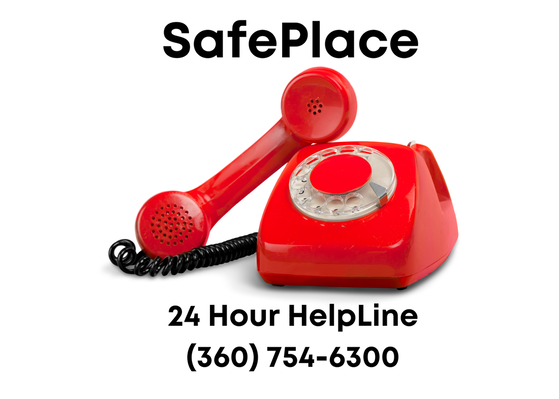Stay Prepared and Stay Safe
Safety plans are personalized strategies to keep yourself or you and your children protected or to help reduce the potential for harm while in an abusive relationship. Leaving abusive relationships can be an uncertain and dangerous time and safety plans can be a useful tool. Brainstorming ways to stay safe can help you feel more prepared for whatever choice you make about your relationship.
In your relationship:
If you are planning to leave:
Cell Phones and Safety:
Cell phones have the capability to call 911 even if they are disconnected or have no minutes left. If you have a cell phone with or without minutes, keep it charged and easily accessible. If you have to call 911, the first thing you should tell dispatch is your address. Many phones do not have systems that can help emergency services to locate you. Even if you think your phone has this capability, you should tell them your address right away.
If you need an emergency phone, our Community Service Center provides free cell phones as available that can be used to call 911. You can stop by during regular business hours, 9:00 am-12:00 pm and 1:00 pm-5:00 pm, Monday through Thursday, to speak to an advocate whether in person or via our phone in order to determine eligibility and inventory.
Protection from economic abuse and control:
Safety at Work:
Safety and Your Children:
Safety and Technology:
Call our HelpLine at (360) 754 6300 to speak directly with an advocate who can assist you in creating a safety plan that best suits your needs.
In your relationship:
- Stay connected. Keep in touch with family and friends to avoid becoming isolated and interacting only with your abusive partner. Keep family and friends informed about your plans and goals.
- Maintain some independence. Having a job, taking a class, or just being able to drive yourself to the store are things to hold on to. These things can help you combat control and create more safety.
- Consider joining a support group if you can do so safely. This offers you the opportunity to talk with others in your situation about their safety strategies.
- Memorize or keep the number of a 24-hour crisis line in your pocket or other safe place.
- Avoid situations, when possible, that have made you feel unsafe before. Getting in a car with an abusive partner can be unsafe for many people. Drinking and using drugs can also escalate abusive behavior, but can also have a deescalating effect. Think about how your abusive partner might use substances and how it could help or hinder your immediate safety in situations.
- Trust your instincts. If you feel like you need help, then you need help.
If you are planning to leave:
- Have a bag packed somewhere safe. Keep it handy in case you need to leave quickly, or leave it with a trusted neighbor, friend or relative. You may want to include:
- Copies of any legal or important documents like birth certificates, social security cards or parenting plans
- An extra set of keys to house and vehicle
- Money, if possible
- Clothing
- Prescribed medication and, if you have children, their medical prescriptions.
- Establish a code word with friends/neighbors/family so that you can communicate that you need the police.
- Know how to quickly get out of your house; practice and visualize this.
- Plan where you will go if you have to leave.
- Trust yourself. Sometimes it may feel safe to leave, other times you may need to appease the abuser in order to keep yourself or you and your children safe.
Cell Phones and Safety:
Cell phones have the capability to call 911 even if they are disconnected or have no minutes left. If you have a cell phone with or without minutes, keep it charged and easily accessible. If you have to call 911, the first thing you should tell dispatch is your address. Many phones do not have systems that can help emergency services to locate you. Even if you think your phone has this capability, you should tell them your address right away.
If you need an emergency phone, our Community Service Center provides free cell phones as available that can be used to call 911. You can stop by during regular business hours, 9:00 am-12:00 pm and 1:00 pm-5:00 pm, Monday through Thursday, to speak to an advocate whether in person or via our phone in order to determine eligibility and inventory.
Protection from economic abuse and control:
- Ask for password protection on all your accounts: Puget Sound Energy, City of Olympia, Comcast, Qwest, Verizon, etc., can provide this service. All you need to do is call and request it. If you have other accounts, feel free to ask about this service. Don’t be afraid to ask to speak to a supervisor if the customer service representative you speak with is not familiar with this process. Even from jail abusers can continue to use economic control. Whether you are planning to leave your abusive partner or not, consider opening a separate account or leaving money with a trusted friend or family member.
- You can speak to an attorney at SafePlace’s legal clinic about things you can do to protect your assets from an abusive partner.
Safety at Work:
- Tell someone at your work about your situation. It’s your right to request and expect confidentiality.
- Provide a picture of the abuser, if possible; office security may be available.
- Make a safety plan for when you enter and leave work; have someone escort you to your vehicle.
- Your schedule should be kept confidential by your employer. Make sure others know that by explaining to front desk workers or other coworkers that information about you should never be given out to anyone that comes in and asks about you.
Safety and Your Children:
- Talk with your children. Chances are they know something is going on. Find a way to explain the situation to them in an age appropriate way.
- Teach them to use the phone to call 911. Talk with them about how they can stay safe if they ever feel in danger or see something dangerous.
- Talk with your children’s schools and child care provider. Provide a picture of the abuser. Talk with them about how you will work together to protect your children.
- Create a code word to use so that information about the children and/or pick-ups cannot be arranged without it.
- If you have to exchange your children for visitation, do so in a safe location and find someone to accompany you if that will make you feel safer. You can also call our HelpLine to inquire about possible safe drop-off locations.
Safety and Technology:
- Monitoring – Abusers often control survivors by monitoring their every move whether in person or online. If possible, don’t use your cell phone or personal computer to access services. Visit the local library and use one of their computers or call SafePlace to schedule some time to use a computer in our office. Change password frequently and try to do minimal communication by email.
- Protecting your History – Clear your browser history when using your personal computer. Find the toolbar at the top of the webpage and delete recent history. For support on how to do this, call our 24-hour helpline to speak to an advocate. If you have social media, remove any tagged pictures and location settings.
- Apps – myPlan is a free app to help with safety decision if you or someone you care about is experiencing abuse. For more information visit: https://www.myplanapp.org/ There are also anti-virus apps that can be downloaded to help track hidden apps that have been downloaded onto your phone.
Call our HelpLine at (360) 754 6300 to speak directly with an advocate who can assist you in creating a safety plan that best suits your needs.


